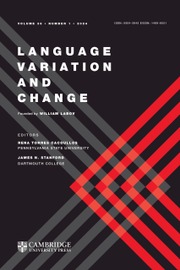Crossref Citations
This article has been cited by the following publications. This list is generated based on data provided by
Crossref.
Tagliamonte, Sali
and
Lawrence, Helen
2000.
“I Used to Dance, but I Don’t Dance Now”.
Journal of English Linguistics,
Vol. 28,
Issue. 4,
p.
324.
ZIEGELER, DEBRA
2003.
REDEFINING UNIDIRECTIONALITY: INSIGHTS FROM DEMODALISATION.
Folia Linguistica Historica,
Vol. 37,
Issue. Historica vol. 24,1-2,
Tagliamonte, Sali
and
D’Arcy, Alex
2004.
He’s like, she’s like: The quotative system in Canadian youth.
Journal of Sociolinguistics,
Vol. 8,
Issue. 4,
p.
493.
Tagliamonte, Sali
2004.
The Handbook of Language Variation and Change.
p.
729.
Thibeau, Tully
2005.
Review of Rohdenburg & Mondorf (2003): Determinants of Grammatical Variation in English.
Studies in Language,
Vol. 29,
Issue. 3,
p.
683.
WALKER, JAMES A.
and
MEYERHOFF, MIRIAM
2006.
ZERO COPULA IN THE EASTERN CARIBBEAN: EVIDENCE FROM BEQUIA.
American Speech,
Vol. 81,
Issue. 2,
p.
146.
Levey, Stephen
2006.
Tense Variation in Preadolescent Narratives.
Journal of English Linguistics,
Vol. 34,
Issue. 2,
p.
126.
Tagliamonte, Sali A.
2006.
“So cool, right?”: Canadian English Entering the 21st Century.
Canadian Journal of Linguistics/Revue canadienne de linguistique,
Vol. 51,
Issue. 2-3,
p.
309.
Poplack, Shana
and
Malvar, Elisabete
2007.
Elucidating the transition period in linguistic change: The expression of the future in Brazilian Portuguese.
Probus,
Vol. 19,
Issue. 1,
Tagliamonte, Sali A.
2007.
Creating and Digitizing Language Corpora.
p.
205.
Schwenter, Scott A.
and
Cacoullos, Rena Torres
2008.
Defaults and indeterminacy in temporal grammaticalization: The ‘perfect’ road to perfective.
Language Variation and Change,
Vol. 20,
Issue. 1,
p.
1.
Tagliamonte, Sali A.
and
Denis, Derek
2008.
LINGUISTIC RUIN? LOL! INSTANT MESSAGING AND TEEN LANGUAGE.
American Speech,
Vol. 83,
Issue. 1,
p.
3.
Hruschka, Daniel J.
Christiansen, Morten H.
Blythe, Richard A.
Croft, William
Heggarty, Paul
Mufwene, Salikoko S.
Pierrehumbert, Janet B.
and
Poplack, Shana
2009.
Building social cognitive models of language change.
Trends in Cognitive Sciences,
Vol. 13,
Issue. 11,
p.
464.
Kapatsinski, Vsevolod
2009.
Adversative conjunction choice in Russian (no, da, odnako): Semantic and syntactic influences on lexical selection.
Language Variation and Change,
Vol. 21,
Issue. 2,
p.
157.
LeBlanc, Carmen L.
2009.
Conditional morphology in si-clauses: A Canadian-French reanalysis.
Canadian Journal of Linguistics/Revue canadienne de linguistique,
Vol. 54,
Issue. 2,
p.
317.
Cacoullos, Rena Torres
and
Walker, James A.
2009.
On the persistence of grammar in discourse formulas: a variationist study of that.
Linguistics,
Vol. 47,
Issue. 1,
p.
1.
Kiefte, Michael
and
Bird, Elizabeth Kay-Raining
2010.
The Lesser-Known Varieties of English.
p.
59.
이동국
2010.
A corpus-based analysis of English future expression be going to.
Korean Journal of English Language and Linguistics,
Vol. 10,
Issue. 2,
p.
277.
Aaron, Jessi Elana
2010.
Pushing the envelope: Looking beyond the variable context.
Language Variation and Change,
Vol. 22,
Issue. 1,
p.
1.
Hoffman, Michol F.
and
Walker, James A.
2010.
Ethnolects and the city: Ethnic orientation and linguistic variation in Toronto English.
Language Variation and Change,
Vol. 22,
Issue. 1,
p.
37.


